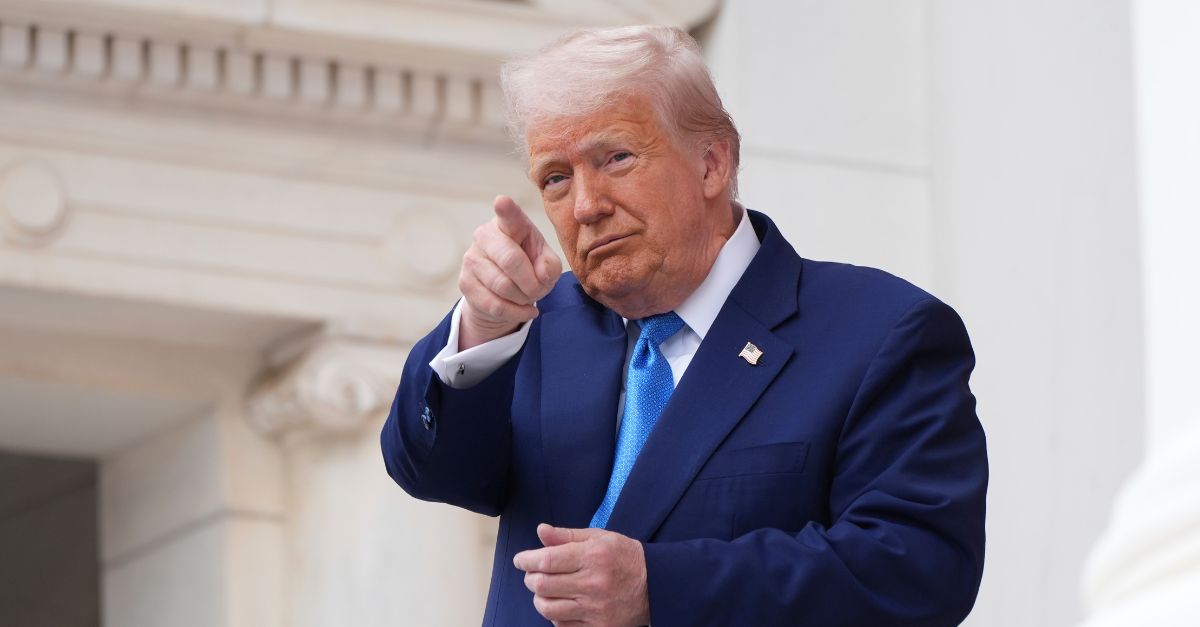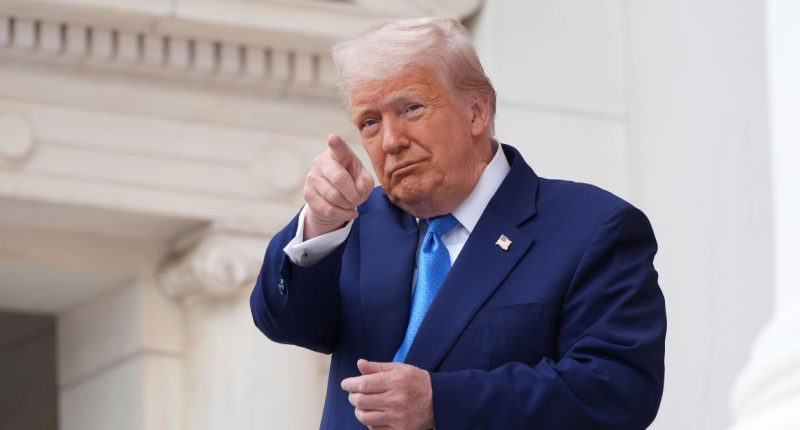
President Donald Trump attends the 157th National Memorial Day Observance at Arlington National Cemetery, Monday, May 26, 2025, in Arlington, Va. (AP Photo/Jacquelyn Martin).
The Trump administration can now move forward with plans to slash billions in allocated funding for the nation”s premier foreign aid program, a federal court of appeals ruled on Wednesday.
In the case stylized as Global Health Council v. Trump, a 2-1 panel on the U.S. Court of Appeals for the D.C. Circuit determined the plaintiffs “lack a cause of action to press their claims.”
On the first day of his second administration, President Donald Trump moved to all but cease foreign aid projects operated – and funded – under the banners of USAID and the State Department. In executive orders and ensuing policy directives and memorandums, the 45th and 47th president, along with various cabinet officials, moved to effectuate this policy. Within weeks, thousands of grant awards were suspended or terminated – while some projects received waivers.
In turn, a coalition of grantees and associations sued and then moved for a temporary restraining order. The plaintiffs allege the rescissions violate the separation of powers and the Administrative Procedure Act (APA), and are ultra vires – or beyond the executive branch’s power.
Love true crime? Sign up for our newsletter, The Law&Crime Docket, to get the latest real-life crime stories delivered right to your inbox.
At the trial court level, U.S. District Judge Amir H. Ali, a Joe Biden appointee, scoffed at Department of Justice lawyers during a March hearing and issued a bench order directing the government to release the funds in question. Then, days later, Ali issued a formal order describing the Trump administration’s actions as unconstitutional and “unlawful.”
Now, in a 33-page opinion consolidating two related cases, the appellate panel overruled the district court and vacated the injunction by essentially rejecting the ability of the plaintiffs to even sue.
“They may not bring a freestanding constitutional claim if the underlying alleged violation and claimed authority are statutory,” the majority writes. “Nor do the grantees have a cause of action under the APA because APA review is precluded by the Impoundment Control Act (ICA). And the grantees may not reframe this fundamentally statutory dispute as an ultra vires claim either.”
Penned by Circuit Judge Karen LeCraft Henderson, a George H.W. Bush appointee, and joined by Circuit Judge Gregory G. Katsas, appointed by Trump during his first term, the opinion found Ali “committed legal error” due to the lack of a cause of action.
This conclusion relies on a rarely invoked analysis of standing – a framework used to defeat lawsuits against the government. In fact, the panel finds the plaintiffs do have standing. The U.S. Supreme Court, however, considers the basic question of whether there is a “cause of action” to be part of such an inquiry.
Here, while the panel finds the plaintiffs did actually suffer a cognizable “injury in fact” due to their “financial injuries,” the majority determined they framed the lawsuit entirely incorrectly.
“[T]he grantees assert a non-statutory right to vindicate separation-of-powers principles but they are foreclosed from doing so,” the panel says.
To hear the panel tell it, the plaintiffs tried to “recast” a statutory claim – which is controlled by the ICA – as a constitutional claim by alleging the president acted in excess of his authority.
“[S]tatutory claims cannot be transformed into constitutional ones,” the court goes on. “Here, the ICA provides a mechanism for the President to act on impoundment. Finally, [an earlier case related to an executive order] states that ‘an independent claim of a President’s violation of the Constitution would certainly be reviewable,’ but here the constitutional claim is predicated on underlying statutory violations.”

Priya Kathpal, right, and Taylor Williamson, who work for a company doing contract work for the United States Agency for International Development, or USAID, carry signs outside the USAID headquarters in Washington, Monday, Feb. 10, 2025 (AP Photo/Manuel Balce Ceneta).
The panel also addresses the availability of the ICA to provide a cause of action – and again finds the law working against the plaintiffs.
While one group of plaintiffs did, in fact, file an ICA claim, they were not allowed to do so, the panel ruled. That’s because the panel found the ICA specifically – and singularly – allots the filing of such lawsuits to the Comptroller General, the leader of the General Accountability Office, “which is constitutionally part of the legislative branch.”
The availability of the ICA – both expansive in its reach over presidential conduct and limited in its availability to plaintiffs – means the APA claims were filed too early and must also fail, the majority ruled. But, the panel said, such claims may be available in the future.
In dissent, Circuit Florence Y. Pan, a Joe Biden appointee, rubbished her colleagues in exceedingly strong terms.
“Today, a President defies laws enacted by Congress without any legal basis, and the court holds that he has merely violated a statute, that the Constitution is not even implicated, and that there is no judicially enforceable cause of action to challenge his conduct,” the dissent rages. “By failing to rein in a President who ran roughshod over clear statutory mandates, the court ‘evade[s] [its] constitutional responsibility to delineate the obligations and powers of each branch’ of our government.”
Notably, the DOJ failed to mention the opinion used as precedent by the majority to fashion the Trump administration’s victory, which drew critical comments from both Henderson and Pan.
“[T]he grantees argue in a surreply brief that the government has forfeited reliance on [the relevant precedent] by failing to raise it in its opening brief,” the majority notes. “That oversight is hard to understand.”
Henderson justified using the opinion anyway, saying the government made some of the arguments contained in the opinion without mentioning it by name and that courts have “independent power to identify and apply the proper construction of governing law.”
Pan accused the majority of doing the DOJ’s homework for them and bending over backwards to give the Trump administration a victory.
“My colleagues in the majority excuse the government’s forfeiture of what they perceive to be a key argument, and then rule in the President’s favor on that ground, thus departing from procedural norms that are designed to safeguard the court’s impartiality and independence,” the dissent goes on. “Moreover, the court’s holding that the grantees have no constitutional cause of action is as startling as it is erroneous.”







